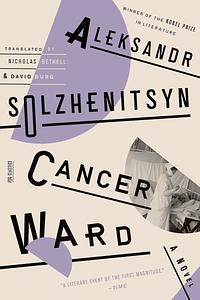Take a photo of a barcode or cover
challenging
emotional
hopeful
informative
reflective
sad
slow-paced
Plot or Character Driven:
Character
Strong character development:
Complicated
Loveable characters:
Complicated
Diverse cast of characters:
Yes
Flaws of characters a main focus:
Yes
challenging
sad
slow-paced
Plot or Character Driven:
Character
Strong character development:
Yes
Loveable characters:
Yes
Diverse cast of characters:
Yes
Flaws of characters a main focus:
Yes
dark
emotional
informative
sad
tense
slow-paced
An excellent novel. A window into 1950's Russia and many of the issues faced then. Also a stout warning to other countries leaning toward socialism.
This story tore out my heart. The emotions and troubles that all of the characters and doctors faced made this an emotional roller coaster, sometimes flying high on hope and others living in despair. I highly recommend reading this!
PAVILIONUL CANCEROŞILOR PURTA chiar numărul treisprezece. Pavel Nikolaevici Rusanov n-a fost niciodată şi nici n-ar fi avut cum să fie superstiţios, dar ceva s-a prăbuşit în el când medicul i-a scris pe trimitere: „pavilionul treisprezece". De ce nu s-or fi gândit să boteze cu treisprezece altă secţie, cea de ortopedie, de exemplu, sau de afecţiuni gastrice?
Cum-necum, în toată republica numai la această clinică putea găsi ajutor.
- Dar eu n-am cancer, doctore, nu-i aşa? Nu-i aşa că n-am cancer? întreba cu speranţă în glas Pavel Nikolaevici, pipăind uşurel, pe partea dreaptă a gâtului, umflătura urâtă, care creştea văzând cu ochii sub stratul nevinovat de piele albă care încă o mai acoperea pe dinafară.
- Nu, bineînţeles că nu, îl liniştea pentru a zecea oară doctoriţa Donţova, în timp ce-i umplea paginile fişei cu scrisul ei avântat. Cînd scria îşi punea ochelarii pătrăţoşi-rotunjiţi, de cum înceta să scrie – îi scotea. Nu mai era tînără şi arăta palidă, foarte obosită.
Cum-necum, în toată republica numai la această clinică putea găsi ajutor.
- Dar eu n-am cancer, doctore, nu-i aşa? Nu-i aşa că n-am cancer? întreba cu speranţă în glas Pavel Nikolaevici, pipăind uşurel, pe partea dreaptă a gâtului, umflătura urâtă, care creştea văzând cu ochii sub stratul nevinovat de piele albă care încă o mai acoperea pe dinafară.
- Nu, bineînţeles că nu, îl liniştea pentru a zecea oară doctoriţa Donţova, în timp ce-i umplea paginile fişei cu scrisul ei avântat. Cînd scria îşi punea ochelarii pătrăţoşi-rotunjiţi, de cum înceta să scrie – îi scotea. Nu mai era tînără şi arăta palidă, foarte obosită.
challenging
hopeful
informative
reflective
sad
slow-paced
I don't know what it was that gave me trouble with this book because it is obviously a masterpiece. Sometimes, we approach a book at the wrong time. I probably should have put this down and come back to it later, which would have made it less of a slog to get through, but I'd done that twice and didn't want to abandon it again. I'm glad I stuck with it as the second half of the book, concentrating more on Kostoglotov, was much better for me than the first.
Also, totally randomly I discovered that Solzhenitsyn's musings about dogs are some of the most touching portrayals of the animals that I've ever encountered.
Also, totally randomly I discovered that Solzhenitsyn's musings about dogs are some of the most touching portrayals of the animals that I've ever encountered.
I loved this so much. I have struggled with Russian literature, and although I enjoyed One Day in the Life of Ivan Denisovich, I chalked that up to its length (or lack thereof) more than anything. But maybe I should consider that I just enjoy Solzhenitsyn's writing, and the way he thinks.
This is about patients in a cancer ward, but it's set two years after Stalin's death and it's also about the cancer that his government was on Russia. The story works on all levels and while some knowledge is helpful, you don't have to have a degree in Russian history to understand it.
(Completely unrelated side note: Solzhenitsyn describes dogs like someone who was really, really a dog person. It makes me like him even more.)
This is about patients in a cancer ward, but it's set two years after Stalin's death and it's also about the cancer that his government was on Russia. The story works on all levels and while some knowledge is helpful, you don't have to have a degree in Russian history to understand it.
(Completely unrelated side note: Solzhenitsyn describes dogs like someone who was really, really a dog person. It makes me like him even more.)
challenging
reflective
sad
slow-paced
Plot or Character Driven:
Character
Loveable characters:
Yes
Diverse cast of characters:
Yes
Flaws of characters a main focus:
Yes








